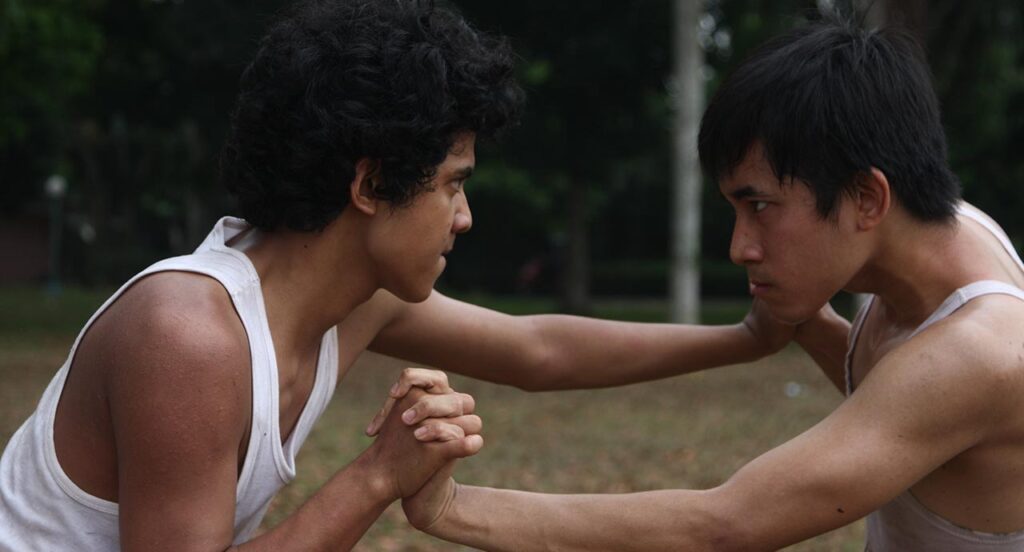Youths and Sexuality
Films Featured:
The Fox Exploits the Tiger’s Might (Lucky Kuswandi, Indonesia)
Junilyn Has (Carlo Francisco Manatad, Philippines)
For Ofelia (Christopher de la Alas, Philippines)
The SEA Short Film Program has provided us with plenty of nuanced and potentially even contrasting portrayals of several themes, but the question its films posed about youth and sexuality is of particular interest to me because of its simplicity.
What is sexuality, and what place does it have in childhood or adolescence?
In simplest terms, sexuality is presented as an extension of power in each of the three films. Its place is up for interpretation, and it is almost entirely based on context.

The Fox Exploits the Tiger’s Might is so unabashedly sexual that it may just scare audiences away. It does not attempt to be anything other than sexual; from its opening, we know exactly what we are getting. There are no boundaries, and no portrayal is sugarcoated.
Aseng, the film’s main character, is furious in his sexuality — not angry, but constantly attempting to assert the fact that he has a sexual life. His friend David exacerbates his need to make that known; he openly masturbates to the sight of Aseng’s sister-in-law, who is simply chewing gum as she stares at him. When they masturbate together, they are battling to gain the attention of an imaginary girl.
Essentially, Aseng and David are duking it out for who holds the power in their relationship, and it all relies on who can be more sexual, more depraved, and more masculine. They race each other on their bikes, which could be construed as child’s play, but the aggression in that race is all tied to each boy’s insistence that it is their turn. David has grown up with a father who is of importance to the Indonesian military; Aseng simply watches the military men work out from the sidelines. Aseng is the outsider, and he desperately wants to change that. He chooses to force that change through supposed sexual prowess.
They only see their friendship as a competition, and only one person can be the tiger. The other has to be the fox.
Junilyn Has is almost exclusively about sexuality, and yet portrays it in much less overt terms than the previous film. Its title character is stumbling through a life that is decidedly sexual, but is unable to come to terms with that fact. She does not want to embrace her sexuality on someone else’s terms; she is constantly being pushed and criticized by a “mother hen” of sorts who imposes her own philosophies and improprieties on the two girls she trains. She hopes that the Pope will leave the city because they have all gone without business all week – her priorities are clear.

Junilyn wants to relinquish her sexuality. She wants her youth instead. She completes household chores without complaint and attempts to appeal to the head of the house by being competent in that respect. She fills out lottery tickets for her and cooks meals in the morning. She does not dance well, and she hasn’t improved at all despite weeks of training. When she tries to practice a new trick, she hurts herself.
But she has a friend of sorts who is all too happy to work at being an acceptable exotic dancer. She has Junilyn take photos of her in her underwear, which she excitedly poses for. Even when she brings a stuffed animal into the frame, she only wishes to appeal to an audience of customers who may possibly revel in a more youthful image.
For her, youth and sexuality go hand in hand. Her youth provides her power in her sexuality.
For Ofelia gives shine to a character who is unapologetically and staunchly himself, which is particularly impressive considering his young age. His mother refuses his masculinity, forcing him into dresses every Sunday so she can parade a “daughter” around at church. His male friends question it, forcing him on the other side of the line in a game of boys versus girls.

But their opinions do not matter to him; he knows precisely who he is. He gets a girlfriend, burns the clothing his mother has collected for him, and stakes as much of a claim to his own life as a six year old can. He is from a much smaller, more claustrophobic world than the one Junilyn resides in, despite the fact that both films are from the Philippines. After all, church is a primary showcase for the young boy’s mother, and everyone seems to know about his unique existence.
There is bravery in his behavior, even when he realizes that he has hurt his mother by being so bold and brash. He acquiesces, insisting that he can still be a girl every Sunday, even though she tells him it is no longer his responsibility. He is so secure in who he is that femininity is not the enemy; his friends’ insistence that he has no sense of boyhood and has no right to like a girl is all white noise.
He knows something everyone else does not.


